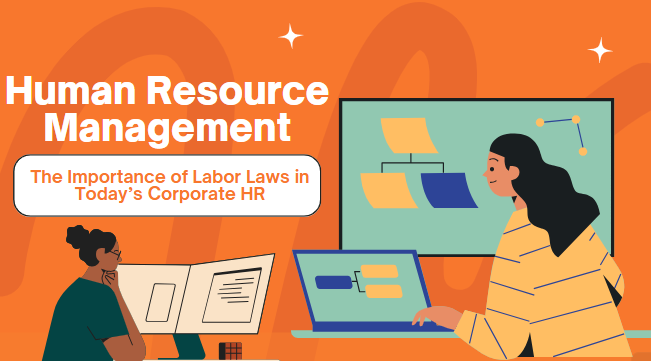
Human resource management (HRM) is more than just hiring, payroll, and employee engagement in the fast-paced, complex business world of today. Labor law compliance is a crucial factor that frequently determines whether HR practices are successful or unsuccessful. Labor laws serve as the cornerstone for treating workers fairly and ethically in all sectors, from employment to retirement.
It is therefore imperative to comprehend the significance of labor regulations in HR if you plan to work in HR or are currently in charge of HR-related duties.
Let’s examine how labor laws are changing the corporate human resources landscape and why HR professionals today need to stay up to date on legal matters and maintain their expertise, particularly through specialized training like the PGDM in Human Resource Management from reputable institutions like MITSDE.
Understanding Labor Laws: More Than Just Legal Jargon
The corpus of legislation that regulates the interactions between employers, workers, trade unions, and the government is known as labor laws. These regulations make sure that justice, equality, and decency are upheld in the workplace. They include everything from equal opportunity, maternity benefits, and termination policies to minimum salaries, working conditions, health and safety, and more.
In the field of human resource management, labor laws serve as a legal framework that guides the formulation of policies and choices. Labor regulations act as a guide and a shield, guiding HR in moral worker management while shielding the business from lawsuits.
📌 Why Are Labor Laws Crucial in HR?
1. Creating a Fair Workplace
HR departments can create fair HR policies with the aid of labor legislation.To safeguard the company and its workers, HR professionals must make sure that policies, whether they deal with overtime compensation, leave entitlement, or workplace safety, adhere to current labor regulations.
2. Reducing Legal Risks
Employee trust can be lost, reputations can be harmed, and expensive litigation can result from breaking workplace laws. To reduce such dangers, HR managers must be aware of their legal obligations.
3. Boosting Employee Morale
Workers who are knowledgeable about labor laws and their rights typically feel safer, more valued, and more devoted to their company. Compliance fosters trust, which is essential for productivity and retention.
4. Shaping Strategic HR Decisions
Almost every HR decision, from onboarding to layoffs, is impacted by labor legislation. For instance, large layoffs or reorganizations have to abide by legal requirements like severance, notice periods, and employee consultation. This demonstrates how strategic HR decisions are impacted by labor legislation.
📊 Labor Law Compliance in Corporate HR: A Growing Challenge
Contemporary organizations function in ever-changing settings, frequently spanning several jurisdictions. This makes corporate HR’s compliance with labor laws more difficult. Regulations pertaining to maternity leave, working hours, and employment discrimination may differ between states or nations.
To manage this, HR professionals must be well-versed in:
- The latest amendments and updates
- Compliance tracking tools
- Cross-border employment regulations
- Labor inspections and audits
Lack of knowledge is no excuse in the eyes of the law. Hence, specialized training in labor law for HR professionals is essential to bridge the knowledge gap.
🎓 Labor Laws in PGDM Human Resource Management Curriculum
Institutions such as MITSDE incorporate labor law modules into the PGDM Human Resource Management program to guarantee that HR professionals are prepared for the workforce. Students receive instruction in:
- Core workplace laws and their real-world applications
- Case studies highlighting violations and outcomes
- Tools for tracking compliance
- Building legal checklists for HR activities
This educational exposure not only empowers students with legal awareness but also prepares them for leadership roles in the HR field. 📘
📚 Key Areas Where Labor Laws Impact HR Functions
🧑⚖️ Recruitment & Hiring
Discrimination laws ensure hiring is based on merit, not biases. HR must avoid discriminatory language and follow equal opportunity protocols.
⏱️ Work Hours & Compensation
Labor regulations define standard work hours, overtime rates, and rest breaks. HR must create compensation structures aligned with legal norms.
🤰 Maternity & Paternity Leave
Leave policies must adhere to legislation like the Maternity Benefit Act. HR also plays a role in ensuring workplace reintegration post-leave.
🧑🏫 Training & Development
With evolving laws, companies must invest in labor law training for HR professionals to stay current and compliant.
⚖️ Disciplinary Actions & Termination
Any disciplinary measure must align with due process and employment laws. Wrongful termination cases can lead to heavy penalties.
🏛️ The Role of MITSDE in Shaping Legally-Aware HR Leaders
MITSDE understands that future HR leaders require legal knowledge in addition to soft skills. Their PGDM in Human Resource Management, thus, provides a well-rounded program with particular emphasis on:
- Industrial Relations & Labor Welfare
- Labor Law & Employment Rights
- HR Compliance & Regulatory Practices
- Organizational Policy and Governance
Students graduate not only with theoretical knowledge but practical insight into the legal responsibilities of HR managers.
🌐 Evolving Labor Laws and Digital Workplaces
The shift to remote and hybrid work has introduced new legal complexities:
- Working hour tracking
- Ergonomic and mental health responsibilities
- Cross-border compliance
- Data privacy laws
In terms of labor laws and HR practices, HR professionals are currently facing a new frontier. It’s quickly becoming essential to comprehend how labor regulations operate in digital environments.
Institutes like MITSDE keep up with these developments by revising their curricula to take into account contemporary issues. No matter where they are, its Online PGDM Human Resource Management program guarantees that students acquire current and pertinent knowledge. 🌍
💼 What Should Aspiring HR Professionals Do?
If you’re aiming for a successful HR career, especially in leadership roles, here’s what you should focus on:
- Understand foundational labor laws like minimum wage, ESI, PF, Maternity, and Gratuity Acts.
- Stay updated on amendments and court judgments that impact labor policy.
- Enroll in structured training like MITSDE’s PGDM in Human Resource Management.
- Practice application-based learning—study real-life HR legal cases.
- Adopt legal technology tools that assist in compliance and documentation.
Combining academic understanding with real-world experience can help you succeed professionally and establish yourself as a respected advisor to the leadership team of your company.
🌟 Final Thoughts
The HR environment of today is competitive, complicated, and compliance-focused. It is impossible to overestimate the significance of labor laws in HR since they form the basis of moral, just, and efficient HR procedures. The need for HR specialists who are knowledgeable about the law will only increase as businesses expand.
So if you’re serious about building a strong HR career, investing in a program that teaches both management and legal skills is a no-brainer.
🌟 Master the art of compliant HR with MITSDE’s Online PGDM Human Resource Management—where leadership meets the law!


